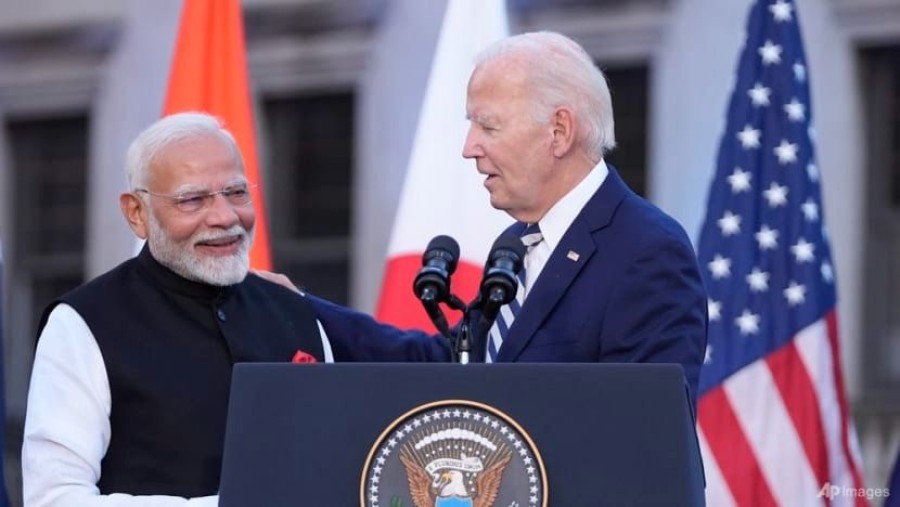How the next American president could affect ties between India and the US

For years, leather products manufacturer Alpine Apparels could export goods to the United States tariff-free under a voluntary trade measure known as the generalised system of preferences (GSP).
That came to a halt in 2019 when the Trump administration withdrew special trade privileges for India – and they have not been reinstated since.
Mr Sanjay Leekha, Alpine Group’s founder and chairman, is now worried that another Trump presidency will spell more bad news for Indian exporters like his.
"When the GSP went away, it increased our landing cost into the US by about 4 to 6 per cent, which is a substantial cost,” he told CNA.
Trump, who was president from 2017 to 2021, has called India a "big abuser of American tariffs".
His opponent, Vice President Kamala Harris, is expected to continue the approach of President Joe Biden, who previously described the US-India relationship as “the most defining of the decade”.
But analysts said her outspokenness about human rights might cause tensions with Indian President Narendra Modi's government.
INDIA’S TIES WITH US UNDER BIDEN
India exports far more to the US than it imports, putting the bilateral trade deficit at over US$45 billion in New Delhi’s favour.
Experts agreed that the last four years of Biden's presidency have brought more stability on the trade and strategic front. He embraced New Delhi wholeheartedly, hosting Modi on his first state visit to the US this year.
During Biden's tenure, both countries also settled outstanding trade disputes, with the US beginning to share critical technology with India to manufacture defence hardware.
Biden's key aim was to help equip India to take on China in the region, said analysts. They added this was why he also prioritised strengthening the QUAD – a diplomatic grouping of Australia, Japan, India and the US.
"Biden has worked pretty systematically to build institutional groups, to create a better balance (in the region),” said Meera Shanker, who served as India’s ambassador to the US in 2009.
She added that should Trump win the election, it would be best that he at least maintains the status quo.
“But if he decides to disrupt the functioning of (the alliances and processes), then it would be a fairly unstable situation,” she noted.
Analysts have said that Trump may not continue the Biden administration's security strategy in the region, although he is expected to be harder on China on trade issues.
CHALLENGES AHEAD FOR INDIA
Shanker said both Trump and Harris could pose different challenges for New Delhi.
Harris first met Modi in 2021 and publicly raised the issue of human rights – a topic that had previously only been discussed behind closed doors.
Analysts also said she could exert more pressure over India’s continued engagement with Russia. New Delhi imports two-fifths of its oil from Russia, and has so far refused to publicly criticise Moscow's ongoing invasion of Ukraine.
“We have China as a neighbour. We have Pakistan as a neighbour, and beyond that, Central Asia and Russia,” noted Shanker.
“Clearly, if there are difficulties with one great power in the neighbourhood, India would like to have the flexibility to have good relations with the other great power and not push it completely into the Chinese corner. So I think the US will have to take a hard look at this.”
“TARIFFS ARE NOT HERE TO STAY”
Meanwhile, Trump has said he will hit hard if he is elected to serve a second term. Last month, he alleged that India imposes the highest tariffs on foreign products and vowed to introduce a reciprocal tax.
He has also often accused India of not allowing American firms to access the subcontinent's vast market using high-tariff barriers.
However, experts say this policy is aimed at giving domestic companies a fair chance to compete with their better-skilled American counterparts.
“Tariffs are not here to stay. Probably the government wants to provide a kind of three-to-four-year framework to these companies, so they scale up. The moment they scale up and they break even, the tariffs will come down,” said Dr Ajai Sahai, director-general and CEO of the Federation of Indian Export Organisations.
ASSASSINATION PLOTS
Separately, there have been little clues on how Trump and Harris would react to recent allegations of Indian officials being involved in assassination plots in the US, and how this would affect diplomatic ties under either’s presidency.
Last month, the US Justice Department announced criminal charges against a former Indian government employee – Vikash Yadav, who remains at large. Washington alleges that he was involved in a murder-for-hire plot on US soil that was ultimately foiled.
Canada has made similar allegations involving Indian envoys in a year-long row that has soured relations.
Following the murder of a Canadian citizen in Vancouver last year, Canada alleged that Indian government agents were involved, culminating in both countries expelling each other’s top diplomats on Oct 14.
Experts say the incoming US administration, whether led by Trump or Harris, could come under pressure to demand more public accountability from India – adding a new hurdle to bilateral ties.
